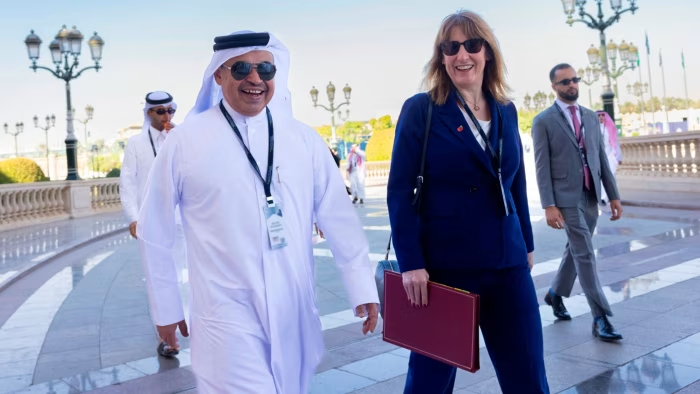Unlock the Editor’s Digest for free
Roula Khalaf, Editor of the FT, selects her favourite stories in this weekly newsletter.
A two-day visit by Rachel Reeves to the “Davos in the Desert” conference in Saudi Arabia has ended with claims that a trade deal between Britain and six Gulf states is “almost done”.
The UK chancellor is seeking the agreement to nudge up Britain’s growth prospects ahead of her November 26 Budget, but also used her visit to drum up investment in a new high-tech Oxford-Cambridge growth corridor.
Qatar finance minister Ali al-Kuwari said at the Future Investment Initiative in Riyadh on Tuesday that a “GCC-UK [trade deal] is almost done”. Reeves replied: “We are going to get that done.”
Meanwhile, Turkey finance minister Mehmet Şimşek said at the same event that talks with Britain on an enhanced free trade agreement were nearing agreement. “With UK we’re almost done,” he said.
Britain is looking to upgrade its current FTA with Ankara, based on the deal struck by the EU with Turkey, to expand trade in areas such as food and agricultural products, along with digital services and other services.
Reeves has held meetings with ministerial counterparts from Saudi Arabia, Qatar and Kuwait to try to finalise a trade deal, and UK trade minister Sir Chris Bryant will be in the Gulf this week for further talks.
The chancellor is seeking to persuade the independent Office for Budget Responsibility to make its growth forecast slightly more optimistic by taking account of trade deals being struck by the Labour government.
The UK government’s analysis suggests a trade deal with the Gulf Cooperation Council — which represents Bahrain, Kuwait, Oman, Qatar, Saudi Arabia and United Arab Emirates — would add only £1.6bn a year to Britain’s GDP.
But Reeves hopes to get the deal over the line before her Budget, adding to trade pacts already agreed with the US, India and the EU, which she claims should be positively “scored” by the OBR.
This in turn would reduce the need for big tax rises, as Reeves contends with a steep downgrade to Britain’s productivity growth forecasts, which analysts believe could create a £20bn hit to the public finances.

The chancellor also used her visit to try to drum up investment in what ministers hope could become Britain’s equivalent of Silicon Valley, a “growth corridor” linking the university cities of Oxford and Cambridge.
The government last week published an investment prospectus for the project, which will see the government funding an east-west rail connection between the cities — a more verdant, British version of the Saudi Line project being planned in the desert.
“We’re investing to connect our world-class university cities and help the next generation of founders and innovators thrive,” Reeves told an investment meeting in Riyadh.
Reeves said the government was investing in new towns, rail, road and housing along with a reservoir and digital infrastructure to turn the area into one of Europe’s most attractive business locations.
Like its Tory predecessors, the Labour government has sought to lure sovereign wealth investment from Gulf states to back its growth agenda.
The UK Treasury claimed Reeves had helped to “unlock over £6.4bn in two-way trade and investment deals with Saudi Arabia”, but that included £5bn of UK government-backed export finance.


